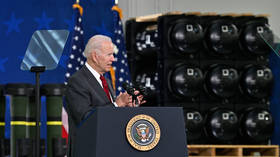NATO convenes special supply meeting
Heads of NATO weapons industries were summoned to Brussels on Tuesday by Secretary General Jens Stoltenberg to discuss ways to replenish stockpiles of weapons and ammunition the US-led bloc has sent to Ukraine. Stoltenberg urged the military-industrial complex to speed up production amid reports the West was running short on key supplies.
The meeting of the Conference of National Armaments Directors (CNAD) focused on the bloc’s “capabilities and munitions stockpiles” in light of the conflict in Ukraine, according to NATO.
“Enhancing NATO stockpiles will ensure we can keep supporting Ukraine,” Stoltenberg said. “We need to keep working together as NATO Allies and with industry to replenish our munitions stocks and provide Ukraine with the support it needs, for as long as Ukraine needs it.”
NATO has sent massive amounts of weapons, ammunition, vehicles and other equipment to Kiev since February, with most of the supplies coming from the US. By the Pentagon’s own admission, the US has sent more than $14.5 billion worth of “security assistance” to Ukraine since the escalation of hostilities, on top of over $17.2 billion since the US-backed coup in 2014.
The US is currently preparing another weapons package for Kiev, valued at $1.1 billion, Reuters reported on Tuesday citing anonymous US officials.
All of these deliveries have put a dent into the US weapons and ammunition stockpile, however. Earlier this month, the Pentagon announced a $311 million contract for some 1,800 Javelin anti-tank missiles. Another $624 million was allocated in May for replenishing the stock of Stinger anti-aircraft missiles.
Stockpiles of 155mm artillery ammunition were “uncomfortably low,” the Wall Street Journal reported at the end of August. Delivering the orders currently takes anywhere from 13 to 18 months, the Journal reported. Meanwhile, the Telegraph reported that the British military industry could take up to two years to restart production on older weapons, while designing and delivering a new missile may take as long as ten.
The US think-tank Center for Strategic and International Studies (CSIS) has pointed out that the American military is “not structured to fight or support an extended conflict,” while the defense defense industry is “sized for peacetime production rates” and expanding capabilities would take years.






Comments are closed.